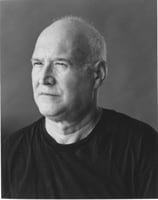
Aharon Shabtai
- Israel
- Zu Gast beim ilb: 2004
Aharon Shabtai was born in Tel Aviv during the British mandate over Palestine in 1939. He spent his childhood on a kibbutz, and he later studied Philosophy and Greek at the Hebrew University in Jerusalem and at the Sorbonne in Paris. After earning his Ph.D. with a dissertation on Aeschylus’ tragedies in 1979, he taught Greek drama at the Hebrew University up to the mid 1980’s, and he has been lecturing on poetry and Greek literature at Tel Aviv University since 1990. As the foremost Hebrew translator of Greek drama including Aeschylus, Sophocles, Euripides, and Aristophanes, Shabtai was awarded the 1993 Prime Minister’s Prize for Translation as well as the 1999 Tchernichowsky Prize. To date he has published seventeen volumes of poetry which also received several prizes. In his long poem ‘Kibbutz’ (1973) Aharon Shabtai describes life in the Zionist-socialist Israel of the 1950’s. ‘Hapoema HaBetit’ (1976; Eng: The Domestic Poem, 1987) consists of 363 vignettes strung on a mythical thread of concrete situations. Several of his poems are mercilessly intimate in their reference to his personal experience of depression, erotic sprees and an unhappy marriage; the tone of these poems is direct and uncompromising. ‘Love & Selected Poems’, which is the English selection of his poems of the past 30 years, was published in 1997. Recently, ‘J’accuse’ has incensed the readers’ passionate response. This collection of political poems had first appeared in the literary pages of the weekend edition of the newspaper ‘Ha’aretz’ and was translated into English in 2003. The title alludes to Emile Zola’s famous letter denouncing the French government’s anti-Semitic bias during the Dreyfus affair. Stylistically and morally drawing from Hebrew liturgy, Aharon Shabtai accentuates his contempt for Israeli politics in the Israeli-Palestinian conflict in scornful pointed rhetoric. The poems cover the years from Netanyahu’s election in 1996 to the second Intifada and it unleashed a storm of indignation. Readers accused him of ignorantly underestimating the actual terrorist threat and implied that he had deep anti-Israeli convictions. But it is the poem ‘Artsenu’ (2002; Eng: Our Country) which is the title of a poetry collection, that reveals Shabtai’s intention; recalling as it does, his childhood prior to the foundation of the State of Israel, the author clearly expresses that his criticism is meant as a defence of his ideal vision of Israel. In 2006, he refused to participate in the Shalom International Poetry Festival in Jerusalem to protest against Israel’s politics. Aharon Shabtai lives in Tel Aviv.
© international literature festival berlin
La première lecture
Editions de l’Eclat
Paris, 1990
Übersetzung: Michel Eckhard-Elial
ha-Poema ha-betit
Am Oved
Tel Aviv, 1990
Love & Selected Poems
The Sheep Meadow Press
New York, 1997
Übersetzung: Peter Cole
Artsenu. Shirim 1987–2002
Hotsa’at ha-Kibuts ha-me’uhad
Tel Aviv, 2002
J’accuse
New Directions
New York, 2003
Übersetzung: Peter Cole
Shemesh shemesh
Hargol
Tel-Aviv, 2006
Übersetzer: Michael Biggins, Peter Cole, Fabjan Hafner, Peter Urban
